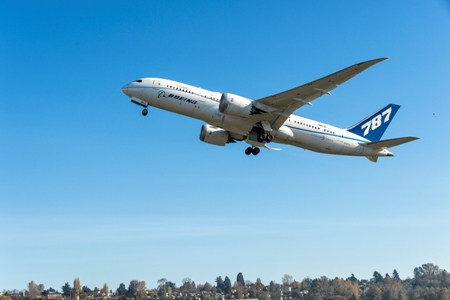
SEATTLE, Nov. 17, 2014 /PRNewswire/ -- The Boeing [NYSE: BA] ecoDemonstrator 787 has begun flight testing more than 25 new technologies aimed at improving aviation's environmental performance through every phase of flight.
The Boeing ecoDemonstrator Program accelerates the testing, refinement and use of new technologies and methods that can improve efficiency and reduce noise. This new round of testing, using 787 Dreamliner ZA004, will evaluate software and connectivity technologies related to operational efficiency; remote sensors to reduce wiring; aerodynamic and flight control improvements for greater fuel efficiency, and icephobic wing coatings to reduce ice accumulation.
"The ecoDemonstrator is focused on technologies that can improve airlines' gate-to-gate efficiency and reduce fuel consumption, emissions and noise," said Boeing Commercial Airplanes President and CEO Ray Conner. "Through the ecoDemonstrator Program, Boeing continues to invest in innovation that benefits the environment and our customers."
ecoDemonstrator 787 tests include:
- NASA Airborne Spacing for Terminal Arrival Routes (ASTAR) to improve landing efficiency
- New greenhouse gas sensors evaluated in collaboration with Japan Airlines and others
- Real-time turbulence reports generated in collaboration with Delta Air Lines to mitigate moderate or greater turbulence events, resulting in improved flight efficiency and passenger comfort
- Instrument landing systems for new and older aircraft to optimize landings and reduce fuel use
- On-Board Wireless Sensor Network and Micro Electro Mechanical Systems microphones to reduce wiring and weight
- Outer wing access doors made from recycled 787 carbon fiber to reduce material costs and factory waste
The ecoDemonstrator 787 completed flight tests in July for an acoustic ceramic matrix composite nozzle designed by Boeing to reduce weight and noise. These tests were part of the FAA Continuous Lower Energy, Emissions and Noise (CLEEN) Program, a competitively bid five-year program with costs shared by participants.
The 787 Dreamliner provides airlines with unmatched fuel efficiency and exceptional environmental performance, reducing fuel use and carbon emissions by 20 percent compared with today's similarly sized airplanes.
In 2011, with an American Airlines Next-Generation 737, the ecoDemonstrator Program tested 15 technologies including aspects of the Advanced Technology Winglet that will improve fuel efficiency by up to 1.8 percent on the new 737 MAX. In 2015, the ecoDemonstrator Program will test more technologies on a 757 in collaboration with TUI Travel Group and NASA.
Supplier partners for ecoDemonstrator 787 technologies and flight tests also include Rolls Royce, Honeywell, Rockwell Collins, General Electric and Panasonic.
For more information about ecoDemonstrator 787 technologies and a complete list of supplier partners, visit www.newairplane.com/environment/#/ecoDemonstrator/
Contacts:
Jessica Kowal
Environment Communications
Boeing Commercial Airplanes
+1 206-660-6849
jessica.m.kowal@boeing.com
Bret Jensen
Engineering Communications
Boeing Commercial Airplanes
+1 425-266-3674
bret.r.jensen@boeing.com
Photo and caption are available here: http://boeing.mediaroom.com
SOURCE Boeing
